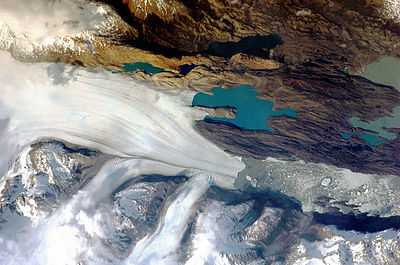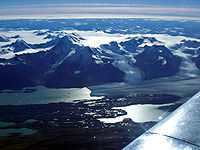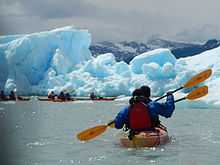Upsala Glacier

The Upsala Glacier is a large valley glacier in Argentina's Los Glaciares National Park. It flows from the Southern Patagonian Ice Field, feeding the nearby Perito Moreno Glacier. The glacier terminus is at Lago Argentino. The Upsala Glacier is well known for its rapid retreat,[1] which many see as evidence for global warming.[2]
The name comes from the old spelling with one p of Uppsala University, which sponsored the first glaciological studies in the area.[3]
The glacier's almost continual recession up until 1999 has recently slowed (as of 2003). The previous acceleration in ice motion during the two decades preceding 1999 may have been augmented by the release of backstress when the glacier retreated beyond the islands in Brazo Upsala.[4]
- Upsala Glacier
-

The Upsala, aerial view
-

View from the Argentino Lake
-
Kayaking in the Upsala Glacier
See also
| Wikimedia Commons has media related to Upsala glacier. |
External links
- Greenpeace campaign film showing the since 1928.
References
- ↑ "Glaciar Upsala en el año 1928" Greenpeace Argentina
- ↑ "Un glaciar patagónico se redujo 13,4 km2 en los últimos 7 años" - Clarín
- ↑ Peru For Less- Destinations- Argentina- Calafate- Perito Moreno Glacier, Upsala Glacier, el Torre Glacier, and El Chalten
- ↑ SKVARCA, P., RAUP, B, & DE ANGELIS, H., Pedro; Raup, Bruce; De Angelis, Hernán (2003). "Recent behaviour of Glaciar Upsala, a fast-flowing calving glacier in Lago Argentino, southern Patagonia Pedro 1". Annals of Glaciology (International Glaciological Society) 36 (1): 184–188. doi:10.3189/172756403781816202.
| |||||||||||||||||||||||||
Coordinates: 49°53′13″S 73°16′21″W / 49.88694°S 73.27250°W
